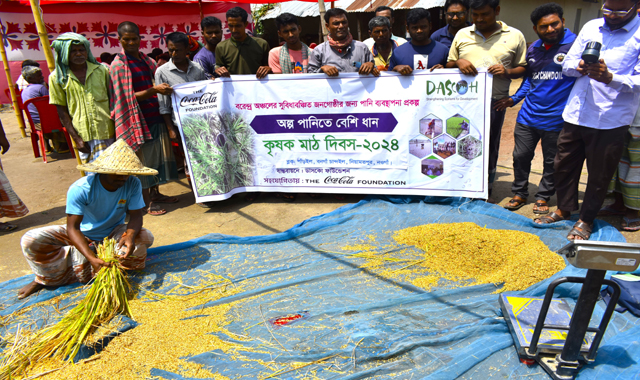
By Md Aynal Haque
RAJSHAHI, May 10, 2024 (BSS)- The irrigation technology of Alternate Wetting
and Drying (AWD) has been reducing wastage of underground water coupled with
boosting paddy yield making the marginalized farmers happy in the water-
stressed Barind area.
Naresh Pahan, 45, a farmer of Peerpukuria village under Niamatpur upazila in
Naogaon district, has got yield of 19.29 mounds through using the AWD
technology from per bigha of lands this year against 14.28 mounds in
conventional system.
"I've harvested 27.8 mounds of yield from per bigha of land through using the
modern irrigation technology against 25 mounds in conventional method," said
Dijen Barman, 53, another farmer of Bangaon Chandil village under the
upazila.
Apart from the aforesaid farmers, many others are getting benefits through
using the technology contributing a lot towards lessening the gradually
mounting pressure on underground water.
Talking to BSS here on Thursday, Kamrul Hassan, upazila agriculture officer,
said they found the additional yield in two separate crop-cutting ceremonies
on Tuesday and Wednesday with the presence of around 200 farmers both male
and female.
Earlier, the disadvantaged and other marginalized farmers were imparted
training on how to get additional yield in less water through using the
technology on behalf of the Water Management Project (WMP).
DASCOH Foundation has been implementing the WMP supported by the Coca-Cola
Foundation aimed at promoting the water-saving technologies among the
underprivileged farmers.
Salient features of the project are to enhance agro-water efficiency, reduce
ground-water extraction and increase farmers' income.
"We are motivating the grassroots farmers to apply the AWD irrigation
technology as it always saves 25 to 30 percent water compared to the
conventional ones," Kamrul Hassan added.
He attributed that the AWD method helps save water in aquifers amidst an
abnormal decline in the level of underground water in the vast Barind tract
for the last couple of years.
WMP Manager Jahangir Alam Khan said adoption of the method would result in a
fivefold reduction in requirement for water and save 30 litres of diesel used
for irrigation and produce an additional 500kg of paddy per hectare.
AWD is a water-saving technology that farmers can apply to reduce their
irrigation water consumption in rice fields without decreasing its yield.
In AWD, irrigation water is applied a few days after the disappearance of the
ponded water. Hence, the field gets alternately flooded and non-flooded.
The number of days of non-flooded soil between irrigations can vary from one
to more than 10 days depending on the number of factors such as soil type,
weather and crop growth stage.
Jahangir Khan said adoption of the irrigation method in Boro farming on a
mass scale can reduce use of underground water by 30 per cent while
simultaneously ensuring additional yield.
Groundwater levels in the Barind area have declined alarmingly due to the
adverse impacts of climate change and excessive extraction.
"Every year, we have to irrigate over 7.52 lakh hectares of farming fields,
including 2.61 lakh hectares of Irri-Boro land, in the region. For this
purpose, we have to operate 14,090 power-driven deep tube wells," Khan said,
adding that irrigation was dependent on groundwater there.
Expressing his grave concern over the present water declining situation,
Chief Executive Officer of DASCOH Foundation Akramul Haque called for more
research, technology and collaboration for strengthening water security in
Rajshahi.
The vast barind tract is being detected as food storage because diversified
crops, including grains, fruits and vegetables, are produced here round the
year contributing a lot towards ensuring food security to the people.
On the contrary, adverse impact of climate change together with abnormal
lowering of underground water and declining condition of surface water
resources are seen posing a serious threat to the farming system besides
living and livelihood conditions of the people.
So, there is an urgent need of adopting need-based steps side by side with
climate-smart technologies to protect the region from all sorts of adverse
negative impacts.